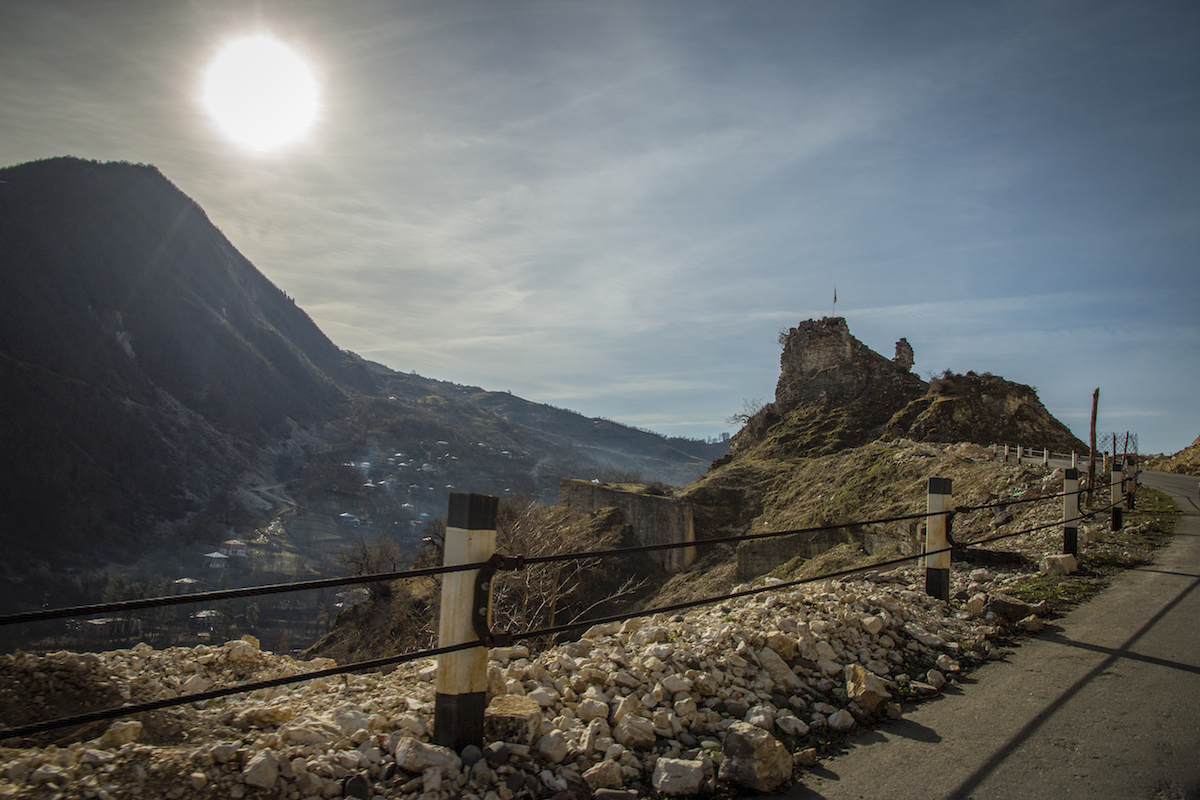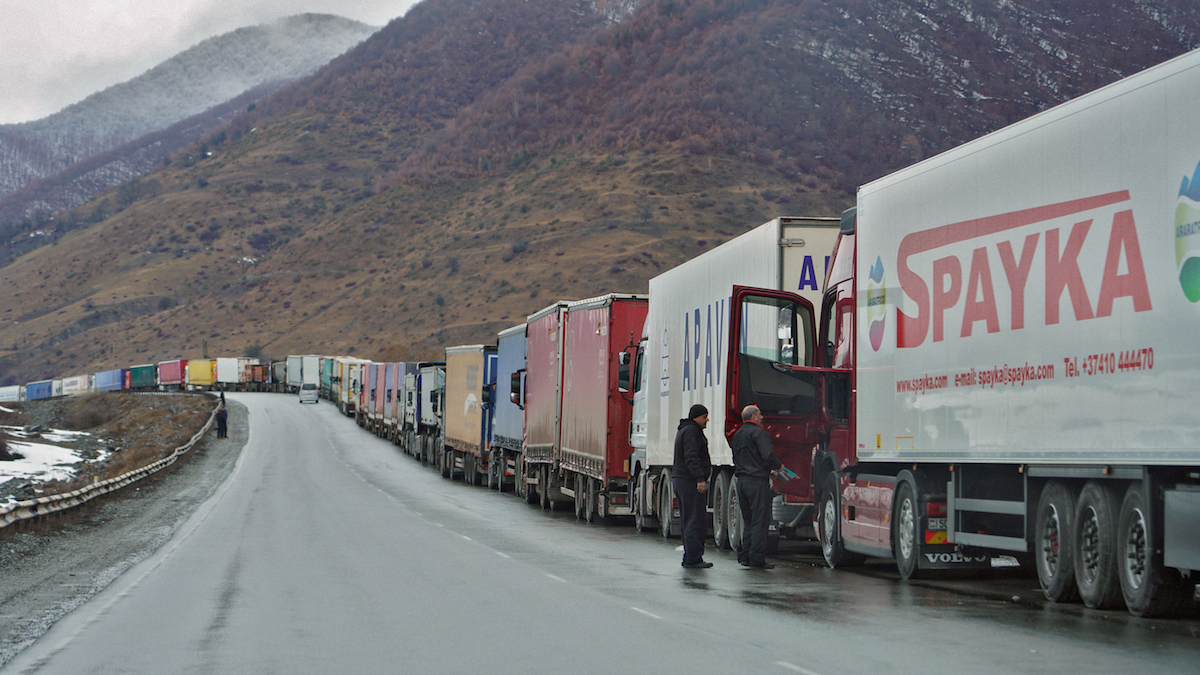A column of trucks on Georgia's southern border. How is it affecting locals?
Traffic on the Georgian-Turkish border
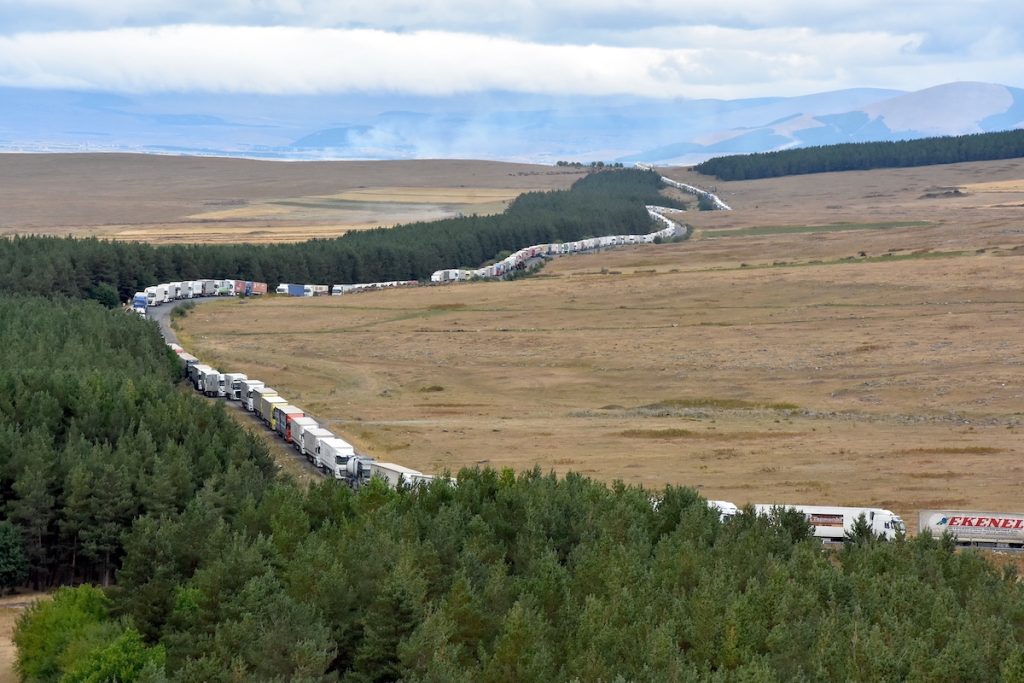
Since May in the Akhalkalaki municipality of Georgia, near the village of Kartsakhi, a long line of trucks has stetched toward the the Kartsakhi checkpoint on the Turkish border.
Apart from damaging Georgia’s reputation as a transport hub, the traffic is making life difficult for the local population. The road is the only one that connects more than ten villages and the municipal center, Akhalkalaki. It’s impossible for locals even to call an ambulance.
There is a huge convoy of trucks on the highway near the village of Vachiani. Some of the drivers sit in groups, discussing the war among themselves; some wander aimlessly back and forth. Others set up tables and drink tea, sleep, or talk to family on video.
Armenian, Turkish, Azerbaijani, Russian -many languages are heard here.
Most of these cars are from Turkey, but also from Azerbaijan, Russia, Ukraine, Iran, Uzbekistan, Kyrgyzstan and other countries.
The Kartsakhi customs checkpoint is located in the village of Kartsakhi, 25 kilometers from Akhalkalaki, and is one of three checkpoints between Georgia and Turkey.
Kartsakhi was opened in 2015. The locals did not welcome it. The Armenian population of the region openly said that a direct connection with Turkey would certainly cause them at least psychological discomfort.
However, local residents were convinced that, along with improving Georgia’s transit potential, this $10 million project would also benefit the local population.
It was assumed that Kartsakhi would see about 200 trucks and 5,000 people daily, with additional money coming in to the region.
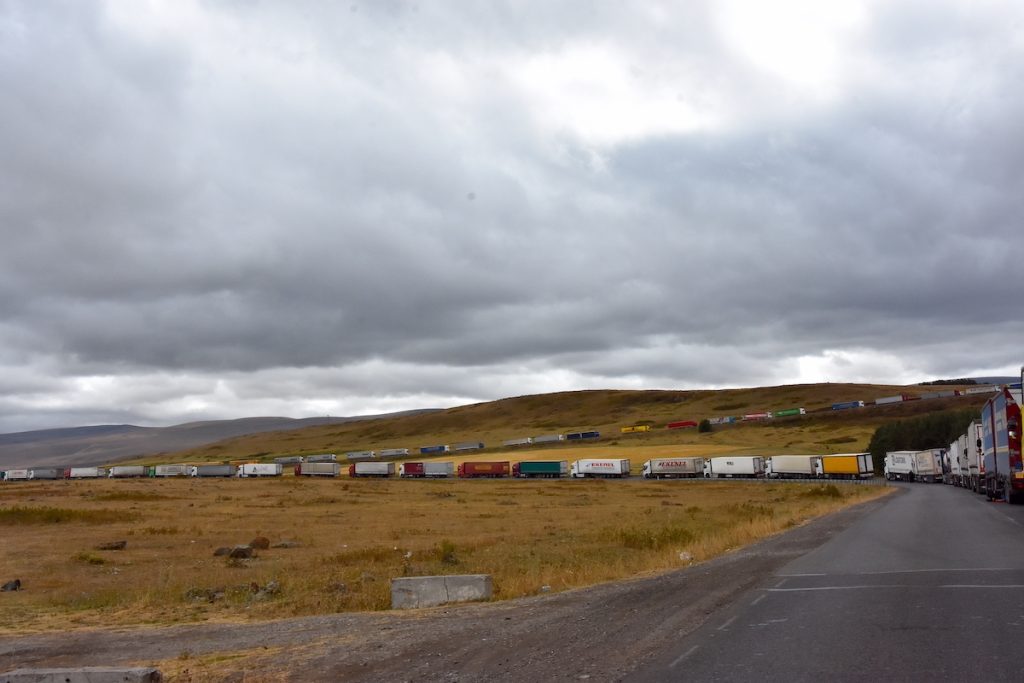
At first it was true and Kartsakhi coped with the flow of vehicles. But after the war broke out in Ukraine and the vehicles piled up, it made things uncomfortable for residents. Traffic on the Georgian-Turkish border is becoming critical.
For more than five months now in the villages of Vachiani, Sulda, Bozal and Kartsakhi, there is a line of several kilometers. Local agency Jnews count up to 800 cars per day.
While it usually takes a maximum of fifteen minutes to drive this section of the road, now it can take several hours. Local residents say that ambulances called to the villages are very late.
This road is also important for the agricultural industry. Akhalkalaki region lives off of agriculture. Potatoes must be harvested soon, but due to traffic jams equipment cannot be brought to the fields.
In addition, there is a terrible smell and a lot of dust around.
“We are being put upon. We don’t know how to import agricultural machinery. Let them make a bypass road, why build a road right in the middle of the village? Don’t we live here? People are covered in dust, we don’t know what to do with the harvest,” says Sasun Apoyan, a resident of Vachiani.
“Two days have passed since they started pouring water on the road, and the dust has subsided a little. Before that we could not even see each other. Iven traffic stopped because the drivers could not see the road.
“We are not complaining, the road is important, but maybe they will come up with a solution for us,” Vigen Alekyan, from Apoyan, says.
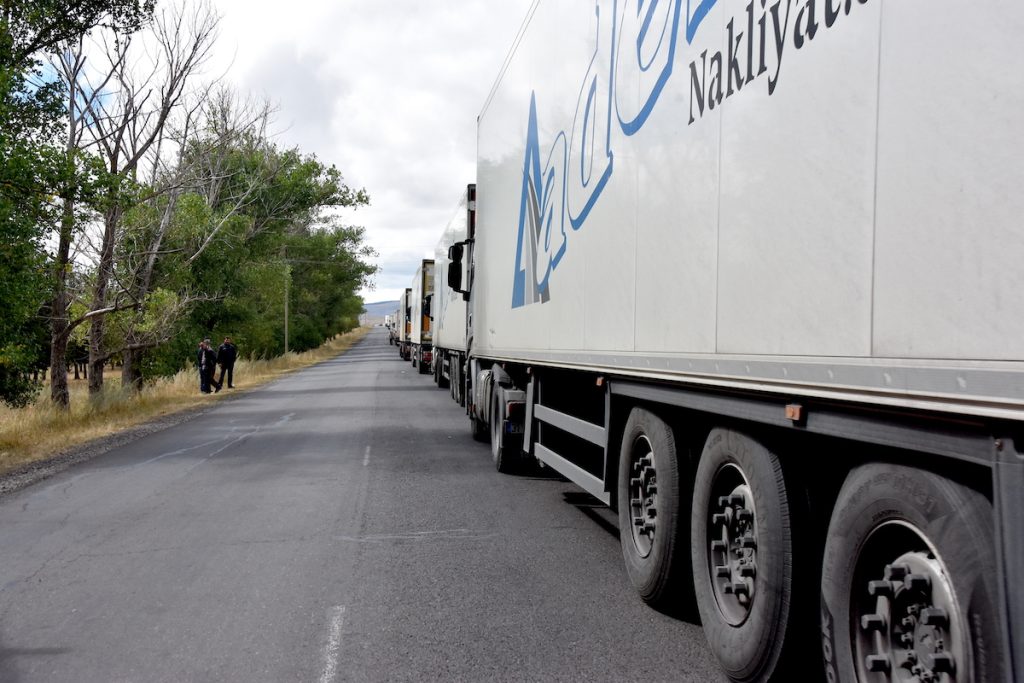
Ararat Marabyan from the village of Sulda says that despite expectations, this road did not bring any benefit to the locals:
“Look, the whole area is littered with trash. What we got – kilometers of garbage in the forest belt. But this is our pasture, where we let our livestock; bags and bottles all around. Cattle eat this plastic.
“We have to harvest the potatoes in ten days. But how? Look, they are standing on the road in such a way that they don’t even keep their distance in order to somehow let the local car through.
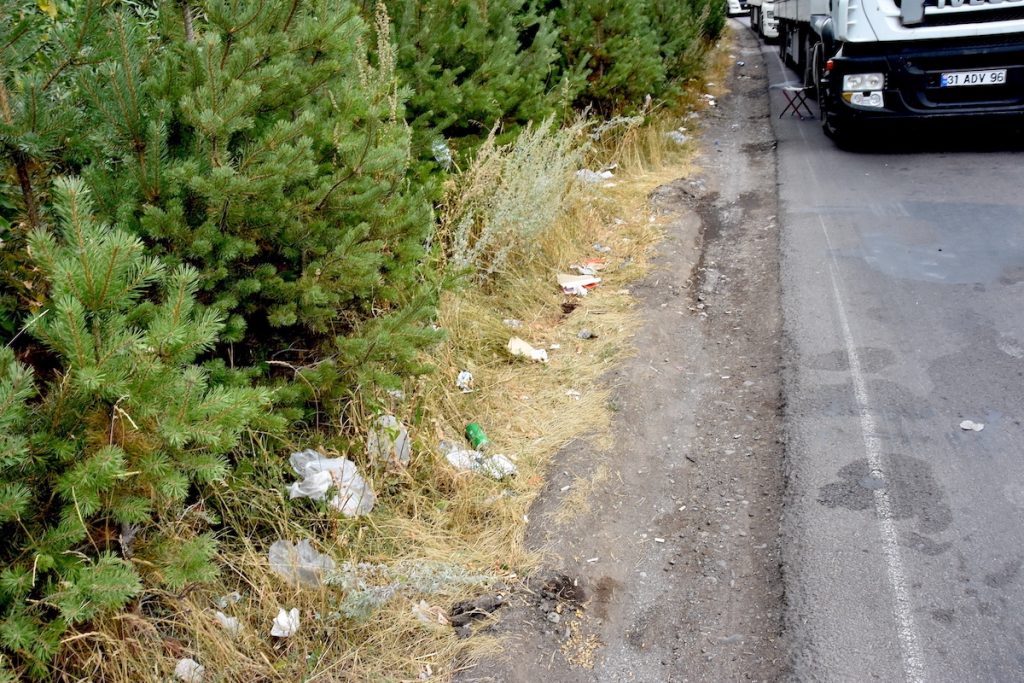
It is still summer, but what will happen in winter when there is a lot of snow? These loads bring us only losses. Will it continue like this until the war is over?” Ararat Marabyan says indignantly.
“There are such jams everywhere in Georgia”
Drivers of parked cars say that the situation is the same at all checkpoints in Georgia.
“We have just arrived from Armenia on our way to Russia. The same traffic jam on the road to Armenia. We have traveled from Russia to Georgia for a very long time; Lars has the same line. We waited two weeks.
We pay for these roads – road, ecology, insurance. We pay 350 lari [about $120] for transit, but this road doesn’t cost that much, they can’t offer us suitable conditions here,” one of the truck drivers says.
“I have been standing here for more than a day and there still is a huge line in front of me. They don’t say anything about when we’ll be let through. Before that we were in Kazbegi, in upper Lars, for six days. Some had to stay there for weeks. They introduced an electronic process, but we didn’t know.
“For obvious reasons, it is now impossible to pass through Ukraine. Previously traffic went through Ukraine and Poland.
I have fabric, metal, wood. Garbage bins should be installed on this road so that there is no litter. There is no toilet nearby. We pay 350 lari for transit. It used to be 220 lari, but now that flow has increased, so has the price.
“Registration is fast, but you still need to get there. It wasn’t designed for this. The customs officers had to add windows,” Belarusian driver Sergei Sadovsky says.
Due to its location and good relations with its neighbors in the Caucasus, one can say that Georgia has a transit monopoly in the region.
A number of transport corridors pass through it. After the war in Ukraine, flow toward Georgia increased even more, which is also confirmed by statistics. And so did traffic on the Georgian-Turkish border.
According to the Ministry of Finance, in the first half of 2022 a record number of trucks crossed Georgia – 209,000, which is 51,000 trailers more than in the previous year.
In January-June, the Georgian budget received 41.9 million lari [$14.5 million] of income from transit cargo; each truck passing through Georgia paid 200 lari until June 20, 2022, and from June 20 this amount increased to 350 lari.
The region is actually threatened by a transport collapse, political scientist Gela Vasadze says.
“Today Russia is isolated and the flow of goods from China to Europe is backing up. Add to this cargo from Turkey to Russia, which also comes through here. Yes, there are ports, but we see what is happening on our roads. From Iran to Russia and back, from Iran to the ports of Georgia, this is a collapse.”
Traffic on the Georgian-Turkish border










